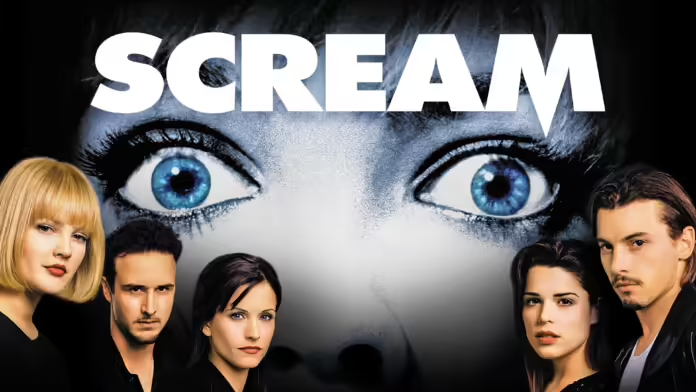The Scream series, launched in 1996 and directed primarily by Wes Craven, revolutionized the horror genre by blending slasher suspense with self-referential humor and satire. Centered around the masked killer Ghostface, the series follows Sidney Prescott, who faces numerous murder sprees and complex mysteries across multiple installments. Known for cleverly breaking the “fourth wall,” the Scream films feature characters who openly discuss horror tropes while trying to survive, setting a precedent for meta-horror in modern cinema.
Financial Success and Revenue
- Overall Box Office: The Scream series has collectively grossed over $900 million globally.
- Scream (1996), with a budget of approximately $14 million, earned $173 million worldwide. Its unexpected success solidified the franchise’s future.
- Each sequel continued to perform well, particularly in the U.S.
Scream 2 (1997) – Budget: $24 million, Revenue: $172 million worldwide.
Scream 3 (2000) – Budget: $40 million, Revenue: $161 million worldwide.
Scream 4 (2011) – Budget: $40 million, Revenue: $97 million worldwide - Recent Films: The 2022 and 2023 releases revitalized the franchise, with Scream VI reaching $168 million, marking it as one of the highest-grossing entries in the series. Total Budget: $24 million and $35 million respectively.
Interesting Facts About ‘Scream’ Movies
- Drew Barrymore’s Surprising Role in the First Film: Although a major star in 1996, Barrymore chose to portray Casey Becker, who is shockingly killed in the opening scene. This decision was strategic—she wanted to subvert audience expectations and add a sense of unpredictability, a nod to the early death of Janet Leigh’s character in Psycho
- Jada Pinkett Smith’s Unique Request: In Scream 2, Pinkett Smith asked director Wes Craven to give her character, Maureen, one of the most intense death scenes in horror. Her request led to a brutal and memorable opening sequence where her character struggles in a crowded theater, emphasizing the horror
- Multiple Endings in Scream 2: To prevent spoilers, screenwriter Kevin Williamson crafted multiple endings. While the final twist reveals Mickey and Mrs. Loomis as killers, alternative versions featured different characters, including Jerry O’Connell’s Derek, as potential Ghostfaces. This helped maintain suspense even for those on set
- Delayed Killer Reveal for Scott Foley: In Scream 3, Scott Foley, playing Roman Bridger, didn’t learn he was the killer until halfway through filming. This decision by the filmmakers added an extra layer of suspense for both Foley and the cast, enhancing the mystery
- Matthew Lillard’s Potential Return: Originally, Stu Macher (played by Lillard) was set to return as the killer in Scream 3, but plans changed. However, there are ongoing fan theories that he could still make a comeback in future installments, keeping fans eager for more twists in the franchise
- Legacy Cast and New Generation: In the 2022 Scream movie, legacy characters like Neve Campbell, Courteney Cox, and David Arquette returned, joining a younger cast including Jenna Ortega. David Arquette found the experience nostalgic and emotional, particularly given the history he shares with the series and his real-life connection with Cox
- Scream (1996): The original Scream used an iconic Ghostface mask discovered during a location scout, which was not originally intended for the movie. It became a signature look for the franchise, and its low cost helped secure licensing rights. Courteney Cox famously pursued the role of reporter Gale Weathers, despite her “nice girl” image from Friends, convincing Wes Craven she could portray a tough character
- Scream 2 (1997): Rushed into production, Scream 2 had issues with script leaks. The original script revealing the killers was leaked online, prompting rewrites to keep the ending secret. Additionally, Craven maintained authenticity by not allowing the cast to meet Roger Jackson, the voice of Ghostface, ensuring genuine reactions to his eerie voice
- Scream 3 (2000): Due to the Columbine tragedy, the script of Scream 3 was altered, moving away from a high school setting with teenage killers to a Hollywood backdrop with adult characters. This installment featured a memorable cameo by Carrie Fisher, who improvised some lines for her brief role as Bianca Burnette, a studio archivist
- Scream 4 (2011): Known for its humor, Scream 4 satirized the horror genre’s remake trend and had several alternate endings shot to preserve secrecy. Emma Roberts, who played a pivotal role, was often hidden from other cast members during key scenes to maintain suspense
- Scream (2022): This “requel” (reboot/sequel) honored Wes Craven by referencing Elm Street in multiple Easter eggs, nodding to Craven’s A Nightmare on Elm Street. David Arquette reprised his role as Dewey, but this time with a darker storyline, which critics praised as one of his best performances
